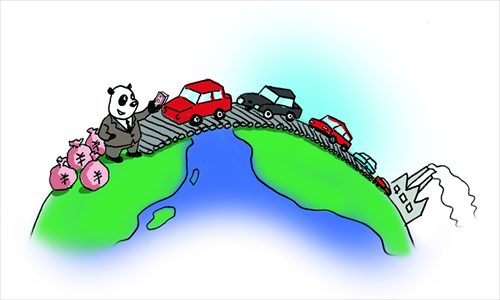Auto classic speaks to power of Chinese markets

Illustration: Liu Rui/GT
The Ford Taurus redefined the sedan for the then world's largest auto market in 1986. Nearly 30 years later, today it's the current world's largest auto market that is redefining the Taurus. Originally launched in 1986, the Ford Taurus remains one of the most groundbreaking American cars ever built. Its innovative styling, ergonomics and quality heralded a new era for the entire concept of sedans and American cars in general. The Taurus was quickly a commercial success, selling over 2 million units by 1991 and checking in annually as the best-selling car in the US until the late 1990s.
Much has changed since the Taurus' glory days of the 1990s. The Taurus is no longer the best-selling car in the US and China is now the world's largest auto market. The Taurus, still an important model for Ford despite losing its best-selling status years ago, was due for a major model revision in 2016. Recognizing the size, stature and future importance of the Chinese market, Ford strategically placed an all-new Taurus as the marquee product for the Chinese market.
Ford formally launched an all-new, China-centric Taurus product at the recent Shanghai auto show. The iconic US sedan's China treatment is an apt metaphor for the growing prominence of the Chinese market and increasingly sophisticated tastes of the Chinese consumers. Like most sedans designed for the Chinese market, the Taurus is meant to be experienced from the back seats. Rear occupants are treated to leather-lined interiors with separate climate control systems, reclining seats with a massage function and other features designed to appeal to Chinese consumers.
Trevor Worthington, Ford's vice president for product development for Asia-Pacific gave a very deliberate nod to Chinese consumers when launching the Taurus. "We have the space, the prestige, the daqi, that business customers are looking for," said Worthington, using the Chinese term for expansive or deluxe.
In 2014, Chinese car buyers bought 19.71 million new vehicles. Between 2005 and 2012, auto sales increased an enormous 221.2 percent, and the market is expected to grow into the next decade. While Volkswagen remains China's best-selling brand, Ford is just one in a line of global automakers giving their product strategy a China makeover.
Ford's new Taurus will be manufactured at the company's brand new $760 million plant in Hangzhou. Ford's joint venture partner in China is Chongqing Changan Automobile Company. Ford has been playing catch-up with US-based competitor General Motors, who just announced a $16 billion plan to invest in 40 new vehicles for the Chinese market by 2020. General Motor's Cadillac brand produced dismal results in 2014, selling just 170,750 cars in the US, a decline of 6.5 percent from 2013.
It remains to be seen if the China-centric Taurus will be sold to US consumers as well. Ford will not formally launch the new Taurus in the US until later this year. The car's China price tag of 300,000 yuan, or nearly $50,000, is likely too high for the US market. It's not unreasonable to expect that the new US Taurus will feature Chinese characteristics of style, but without some of the China-centric market offerings to bring the price in line with the expectations of US consumers.
As long as China remains the world's largest auto market, Chinese tastes will increasingly dictate new models and features. US and other global auto manufacturers will align strategically with the evolving tastes and preferences of Chinese consumers. Ford and every other global auto company active in China look to China as the means to reach and or to maintain prominent global status. Things may not change immediately back in the US and other home markets, but eventually consumers around the world will realize that going forward, global auto design trends will be set by Chinese consumers.
The author is a partner with a natural resource trading and advisory firm where he manages projects across the developing world including China, Russia, Brazil and Africa. opinion@globaltimes.com.cn